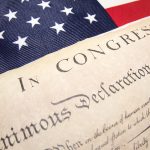
The Myth of the Rule of Law
Monday, May 08, 2017 by Mike Adams
http://www.tyranny.news/2017-05-08-the-myth-of-the-rule-of-law.html

This article by Robert Taylor from Mises.org is one of the most eloquent, clear-headed posts I’ve seen in a very long time. Read this with thoughtfulness and deliberation, and you’ll come to realize just how much we’ve all been turned into literal mind slaves of the coercive state.
Find the full, original article at Mises.org, and remember as you read this that the blabbering, idiotic Left cannot even parse the concepts you are about to encounter here…
The Myth of the Rule of Law
by Robert Taylor
Any state, no matter how powerful, cannot not rule solely through the use of brute force. There are too few rulers and too many of us for coercion alone to be an effective means of control. The political class must rely on ideology to achieve popular compliance, masking the iron fist in a velvet glove. Violence is always behind every state action, but the most efficient form of expropriation occurs when the public believes it is in their interest to be extorted.
Mythology is necessary to blunt the violent nature of state power in order to maximize the plunder of property — and, most importantly, provide an aura of legitimacy. The perception of legitimacy “is the only thing distinguishing a tax collector from an extortionist, a police officer from a vigilante, and a soldier from a mercenary. Legitimacy is an illusion in the mind without which the government does not even exist.”1
State authority, and public obedience to it, is manufactured through smokescreens of ideology and deception. These myths sustain the state and offer an illusion of legitimacy, where orders, no matter how immoral or horrific, are followed because they are seen as emanating from a just authority. The state cannot implement violence against everyone everywhere and overwhelm the host, so the battle is waged against the hearts and minds of the public. Fear is exploited, language is distorted, and propaganda is spread, while narratives and history are tightly controlled. The gulag of state power, first and foremost, always exists in the mind.
If the mythology of state power is smashed, then the state is exposed for what it is: institutionalized violence, expropriator of the peaceful and productive, and entirely illegitimate.
The Myth of the Rule of Law
In order for a society to have peace and order, there needs to be a set of largely uniform and neutral laws in which the vast majority of the public agree are fair and just. Throughout the history of Western law, a decentralized process of trial-and-error, competing courts, and private arbitration achieved these rules. A monopoly power was not necessary, nor desirable. Before the rise of the modern bureaucratic, democratic nation-state, the monarch was the symbol of monopolistic order, and his power consisted mostly in enforcing the private common-law tradition that had already developed over centuries.2
Eventually, the nation-state model we see today grew and absorbed this decentralized tradition into a monolithic, top-down coercive regime imposed by legislatures, state police, and bureaucracies. The “rule of law” became the propaganda term used to justify this radical departure from the Western tradition of common-law and private arbitration. The law was now political in nature, subject to the usual array of corruption and disincentives inherent in any political order. With the monopoly state now in charge of law, the idea that a coercively imposed system of justice — in which everyone is governed by neutral rules that are objectively applied by judges — became a powerful myth for states to exert control over society.
As a myth, however, the concept of the rule of law is both powerful and dangerous. Its power derives from its great emotive appeal. The rule of law suggests an absence of arbitrariness, an absence of the worst abuses of tyranny. The image presented by the slogan “America is a government of laws and not people” is one of fair and impartial rule rather than subjugation to human whim. This is an image that can command both the allegiance and affection of the citizenry. After all, who wouldn’t be in favor of the rule of law if the only alternative were arbitrary rule? But this image is also the source of the myth’s danger. For if citizens really believe that they are being governed by fair and impartial rules and that the only alternative is subjection to personal rule, they will be much more likely to support the state as it progressively curtails their freedom.
The rule of law, imposed by the state, is simply a myth. There is no such thing as “a government of laws and not people.” Legislative edicts are always subject to the biases and agendas of those who interpret them, and will be imposed in this manner by whoever currently wields the power of the monopoly state over society.
For example, despite the US Constitution’s very clear language in most of its passages (there are some dangerously vague sections, of course), the most trained and brilliant legal minds can come to completely opposite conclusions over the exact same clause. Whether it is a particular amendment in the Bill of Rights or the particular language of executive or legislative power, a liberal and conservative judge could use sound reasoning and cite historical precedent to make their case — and they would both be right. “[B]ecause the law consists of contradictory rules and principles,” argues John Hasnas, “sound legal arguments will be available for all legal conclusions, and hence, the normative predispositions of the decision makers, rather than the law itself, determine the outcome of cases.”
The law, then, is not a neutral body of rules to help keep order and govern society; it is merely an opinion with a gun. Whenever the state is in charge of anything, the outcomes, process, and administration are always political in nature. There can never be a system of definite, consistent rules that produce determinate results because these laws, no matter how they are written, will always be subjected to the biases, prejudices, and discrimination of those who interpret and enforce them.
The idea that the law is not neutral or determinant is not a revolutionary doctrine and should not be entirely shocking. Over a century ago, former Supreme Court Justice Oliver Wendell Holmes argued that certainty in law is an illusion; judicial decisions rely more on the language of logic than they do on objective enforcement. Since at least the 1970s, the Critical Legal Studies movement has recognized this, and even they are just reviving the legal realists who made these same insights decades before them. The idea of determinate law is actually an undesirable feature — even if we were to overcome the impossibility of making it so — as the strength of an effective legal system lies in its ability to have certain amounts of flexibility. This is why the decentralized, private law tradition was able to produce several codes of uniform laws — do not murder, steal, assault, or initiate aggression in general — while providing the room to adapt to social change and distinct cultures.
When the law is under the dominion of a top-down, coercive state it is transformed from a system of governance to a body of expropriation. Whether through the use of logic or emotional appeals, whoever wields the state apparatus says what the law is and they will dispense their armed enforcers to make sure their law is fulfilled.
If an objective rule of law is impossible, then why does this myth persist? To ask the question is to answer it. “Like all myths,” notes Hasnas,
it is designed to serve an emotive, rather than cognitive, function. The purpose of a myth is not to persuade one’s reason, but to enlist one’s emotions in support of an idea. And this is precisely the case for the myth of the rule of law; its purpose is to enlist the emotions of the public in support of society’s political power structure.
If the public views the law as a neutral and objective arbiter, then they are more willing to support state power and its violent expropriation and parasitism. We are more willing to accept the comfortable delusion of objectivity and the need for predictable laws than deal with the frightening alternatives of supposedly unpredictable anarchy. “Once they believe that they are being commanded by an impersonal law rather than other human beings,” people “view their obedience to political authority as a public-spirited acceptance of the requirements of social life rather than mere acquiescence to superior power,” notes Hasnas. Tyrants of the past used to claim that their rule was inspired by Divine Right to mask the fact that their rule was an exercise of naked aggression over their subjects. When this doctrine became discredited, a new myth was needed, and the rule of law was born.
No matter how impossible the rule of law may be, the state has a heavy interest in promoting this myth.
Before the rise of legislative law, the private, decentralized, and polycentric common-law system was effective at promoting peace and public order because it lacked the monopoly power of a centralized state. Under both models, laws are never determinate or universally objective. But under a private law system, bad decisions that were not accepted by the public or viewed as overreaches could not be coercively imposed on society. This system of checks and balances allowed laws beneficial to the protection of private property to flourish while weeding out the bad laws.
Under a state system, however, it is much harder, if not impossible, to fix bad laws as there now exists a political incentive to keep the law on the books, while most judges serve lengthy or even life terms. If the judge, legislature, and police are all part of the state apparatus, they will tend to find expansive definitions for state power with limited definitions of individual freedoms.
“The myth of the rule of law does more than render the people submissive to state authority; it also turns them into the state’s accomplices in the exercise of its power,” concludes Hasnas. “For people who would ordinarily consider it a great evil to deprive individuals of their rights or oppress politically powerless minority groups will respond with patriotic fervor when these same actions are described as upholding the rule of law.” While the state does indeed provide some law and order under its jurisdiction, the “rule of law” has been used as a propaganda tool in order to help cement and legitimize state power.
Read more astonishing, eye-opening truth at Mises.org.
Tagged Under: Tags: coercion, justice system, Liberty, Myths, rule of law, state power





